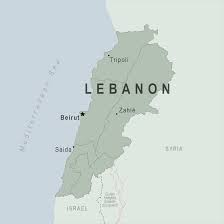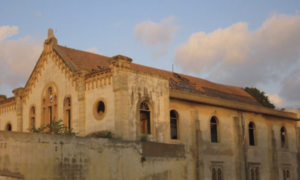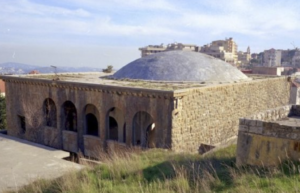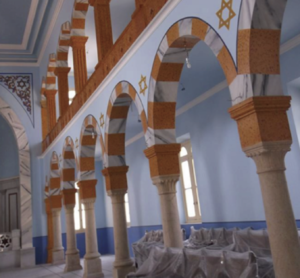 The history of Lebanese Jews dates back to ancient times. Unlike the majority of Arab states, from which Jews left en masse after the founding of the state of Israel in 1948, Lebanon saw its Jewish community grow in the 1950s. During the 1950’s Wadi Abou Jmil prospered. Small Jewish businesses abounded and children attended Jewish schools there. The Maghen Abraham synagogue hosted grand weddings, lectures and study sessions.
The history of Lebanese Jews dates back to ancient times. Unlike the majority of Arab states, from which Jews left en masse after the founding of the state of Israel in 1948, Lebanon saw its Jewish community grow in the 1950s. During the 1950’s Wadi Abou Jmil prospered. Small Jewish businesses abounded and children attended Jewish schools there. The Maghen Abraham synagogue hosted grand weddings, lectures and study sessions.
However, on the negative side, in 1948 Jews were arrested and interned as Zionist spies. In the early 1950s the synagogue in Beirut was bombed, and the Lebanese Chamber of Deputies witnessed heated debates on the status of Lebanese Jewish army officers. Rioting and other antisemitic incidents such as the bombing of the Beirut Alliance Israelite school, killing the principal, occurred.
 During the June 1967 War, antisemitism escalated and Lebanese authorities stationed guards in Jewish districts, when hostility toward Lebanese Jews became overt. Several hundred chose to leave the country. The community’s demise began in earnest after the 1967 Six Day War, which ushered in 200,000 angry Palestinian refugees and a negative change in attitude from the Lebanese authorities. Around 50 per cent of the Jewish population left between 1967-70. It became a dangerous place for them. Lebanon became a training ground for terrorists from all over the world. The PLO was able to recruit sympathizers from other terrorist organizations and from the hundreds of thousands of Palestinian refugees in camps across the country. During the 1970s, PLO terrorists carried out hundreds of cross-border attacks into Israel. One of the worst was the “Ma’alot massacre” in which 26 people, including 21 students, were held hostage and killed in a school in the northern Israeli town of Ma’alot.
During the June 1967 War, antisemitism escalated and Lebanese authorities stationed guards in Jewish districts, when hostility toward Lebanese Jews became overt. Several hundred chose to leave the country. The community’s demise began in earnest after the 1967 Six Day War, which ushered in 200,000 angry Palestinian refugees and a negative change in attitude from the Lebanese authorities. Around 50 per cent of the Jewish population left between 1967-70. It became a dangerous place for them. Lebanon became a training ground for terrorists from all over the world. The PLO was able to recruit sympathizers from other terrorist organizations and from the hundreds of thousands of Palestinian refugees in camps across the country. During the 1970s, PLO terrorists carried out hundreds of cross-border attacks into Israel. One of the worst was the “Ma’alot massacre” in which 26 people, including 21 students, were held hostage and killed in a school in the northern Israeli town of Ma’alot.
 The final blow to the community came at the start of the Lebanese Civil War, when the vast majority of the 3,000 or so remaining Jews fled as the country turned on itself with the Jewish quarter along a fault line that divided warring East and West Beirut.
The final blow to the community came at the start of the Lebanese Civil War, when the vast majority of the 3,000 or so remaining Jews fled as the country turned on itself with the Jewish quarter along a fault line that divided warring East and West Beirut.
Lebanon lost its two wars with Israel, which made Lebanese Jews scapegoats. The first Israel-Lebanon war in 1982-1985 was an attempt by Israel to stop attacks against its citizens by Yasser Arafat’s Palestine Liberation Organization (PLO). The rise of Muslim fundamentalists, especially in the aftermath of the Israeli war of 1982, constituted a real threat to Lebanese Jews. Organizations such as the Khaybar Brigades and the Organization of the Oppressed of the Earth claimed responsibility for kidnapping and killing several Lebanese Jews between 1984 and 1987.
 The second Israel-Lebanon war in 2006 was an attempt by Israel to stop attacks against its citizens by the Lebanese Shi’ite militia, Hezbollah. In both cases Lebanon was the instigator. A group of Hezbollah terrorists crossed the border into Israel and attacked Israeli soldiers patrolling the border. The terrorists killed eight soldiers and kidnapped two others. The Israeli government responded with an air-strike targeting Hezbollah positions inside Lebanon, followed later by a ground offensive designed to remove Hezbollah terrorists from Southern Lebanon.
The second Israel-Lebanon war in 2006 was an attempt by Israel to stop attacks against its citizens by the Lebanese Shi’ite militia, Hezbollah. In both cases Lebanon was the instigator. A group of Hezbollah terrorists crossed the border into Israel and attacked Israeli soldiers patrolling the border. The terrorists killed eight soldiers and kidnapped two others. The Israeli government responded with an air-strike targeting Hezbollah positions inside Lebanon, followed later by a ground offensive designed to remove Hezbollah terrorists from Southern Lebanon.
No more than forty Jews remain in Beirut. Their average age is eighty. There are six Jewish families remaining in west Beirut. Several other families are believed to reside in east Beirut. The few remaining Jews who still live in West Beirut are mostly old, poor and sick. The wealthy and the young live in East Beirut. The Maghen Abraham Synagogue, the only Jewish religious temple left in the capital, has been rebuilt as it was desecrated during in the civil war, however there are essentially no congregants.